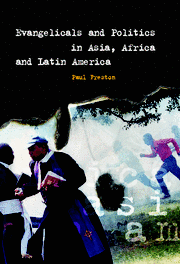Book contents
- Frontmatter
- Contents
- Foreword by David Martin
- Acknowledgements
- List of abbreviations
- Introduction
- PART ONE BRAZIL
- PART TWO ASIA
- PART THREE AFRICA
- 9 Sudan
- 10 Angola
- 11 Mozambique
- 12 Zimbabwe
- 13 Malawi
- 14 Rwanda
- 15 Uganda
- 16 Ghana
- 17 Kenya
- 18 Zambia
- 19 South Africa
- 20 Nigeria
- PART FOUR SPANISH-SPEAKING LATIN AMERICA
- Conclusion
- Bibliography
- Index
- Frontmatter
- Contents
- Foreword by David Martin
- Acknowledgements
- List of abbreviations
- Introduction
- PART ONE BRAZIL
- PART TWO ASIA
- PART THREE AFRICA
- 9 Sudan
- 10 Angola
- 11 Mozambique
- 12 Zimbabwe
- 13 Malawi
- 14 Rwanda
- 15 Uganda
- 16 Ghana
- 17 Kenya
- 18 Zambia
- 19 South Africa
- 20 Nigeria
- PART FOUR SPANISH-SPEAKING LATIN AMERICA
- Conclusion
- Bibliography
- Index
Summary
The picture is little better in Uganda, also influenced by the Revival. Uganda, despite British colonisation, is predominantly Catholic, but Protestants are 30 per cent, the largest group being the (Anglican) Church of Uganda. ‘The real life of the Anglican Church has for long been carried forward by the Revival Movement rather than by the establishment’ (Hastings, in Baur 1994: 487).
Waliggo claims that neither Catholics nor Anglicans have developed, at the institutional level, a clear theology or pastoral strategy for challenging tyranny (1995: 206). This is crucial for Anglicanism, since ‘from Kabaka Muteesa II to Yoweri Museveni, all heads of state in Uganda have had an Anglican background’ – except for Idi Amin (Ward 1995: 103). Even assassination and exiling of bishops has not provoked such a theology or strategy. Ward asks whether the Church of Uganda could have done more to prevent the descent into barbarism under Amin. It suffered serious weaknesses: quasi-establishment tradition, factionalism, failure to confront human-rights abuses early enough, during Obote's first government, and Catholic–Anglican rivalries which were transferred to party politics (ibid.: 82).
This last point is crucial. Waliggo says that by 1892 the hierarchy of religions in Buganda had been set: Anglicans on top, then Catholics, then Muslims and lastly traditionalists (1995: 208). By Ugandan independence in the 1960s, ‘the institutional Anglican Church stood for the status quo which would ensure the continued hegemony of its followers’.
- Type
- Chapter
- Information
- Evangelicals and Politics in Asia, Africa and Latin America , pp. 139 - 142Publisher: Cambridge University PressPrint publication year: 2001



